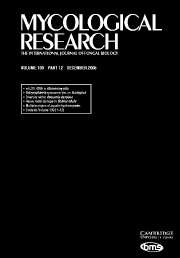Crossref Citations
This article has been cited by the following publications. This list is generated based on data provided by
Crossref.
2000.
21st Century Guidebook to Fungi.
p.
392.
Vellinga, Else C.
2006.
Chlorophyllum in Great Britain.
Field Mycology,
Vol. 7,
Issue. 4,
p.
136.
McKenzie, E. H. C.
Johnston, P. R.
and
Buchanan, P. K.
2006.
Checklist of fungi on teatree (KunzeaandLeptospermumspecies) in New Zealand.
New Zealand Journal of Botany,
Vol. 44,
Issue. 3,
p.
293.
Garnica, Sigisfredo
Weiss, Michael
Walther, Grit
and
Oberwinkler, Franz
2007.
Reconstructing the evolution of agarics from nuclear gene sequences and basidiospore ultrastructure.
Mycological Research,
Vol. 111,
Issue. 9,
p.
1019.
Gube, Matthias
2007.
The gleba development ofLangermannia gigantea(Batsch: Pers.) Rostk. (Basidiomycetes) compared to other Lycoperdaceae, and some systematic implications.
Mycologia,
Vol. 99,
Issue. 3,
p.
396.
Hibbett, David S.
2007.
After the gold rush, or before the flood? Evolutionary morphology of mushroom-forming fungi (Agaricomycetes) in the early 21st century.
Mycological Research,
Vol. 111,
Issue. 9,
p.
1001.
Kibby, Geoffrey
2007.
Fungal portraits.
Field Mycology,
Vol. 8,
Issue. 2,
p.
39.
Dörfelt, H.
and
Gube, M.
2007.
Secotioid Agaricales (Basidiomycetes) from Mongolia.
Feddes Repertorium,
Vol. 118,
Issue. 3-4,
p.
103.
Krüger, Dirk
and
Gargas, Andrea
2008.
Secondary structure of ITS2 rRNA provides taxonomic characters for systematic studies — a case in Lycoperdaceae (Basidiomycota).
Mycological Research,
Vol. 112,
Issue. 3,
p.
316.
Larsson, Ellen
and
Örstadius, Leif
2008.
Fourteen coprophilous species of Psathyrella identified in the Nordic countries using morphology and nuclear rDNA sequence data.
Mycological Research,
Vol. 112,
Issue. 10,
p.
1165.
Padamsee, Mahajabeen
Matheny, P. Brandon
Dentinger, Bryn T.M.
and
McLaughlin, David J.
2008.
The mushroom family Psathyrellaceae: Evidence for large-scale polyphyly of the genus Psathyrella.
Molecular Phylogenetics and Evolution,
Vol. 46,
Issue. 2,
p.
415.
Larsson, Ellen
and
Jeppson, Mikael
2008.
Phylogenetic relationships among species and genera of Lycoperdaceae based on ITS and LSU sequence data from north European taxa.
Mycological Research,
Vol. 112,
Issue. 1,
p.
4.
Vašutová, Martina
Antonín, Vladimír
and
Urban, Alexander
2008.
Phylogenetic studies in Psathyrella focusing on sections Pennatae and Spadiceae — new evidence for the paraphyly of the genus.
Mycological Research,
Vol. 112,
Issue. 10,
p.
1153.
Vellinga, Else C.
2009.
Pseudobaeospora aphana, a new species from California.
Mycologia,
Vol. 101,
Issue. 2,
p.
243.
Han, Ki Soo
Volk, Thomas J.
and
Kim, Hee Kyu
2010.
Identification ofLacrymaria velutina(Pers. Ex Fr.) Konrad & Maubl. from Micheon-myeon, Jinju-city, Korea.
Mycobiology,
Vol. 38,
Issue. 4,
p.
249.
Zhao, Rui-lin
Desjardin, Dennis E.
Soytong, Kasem
Perry, Brian A.
and
Hyde, Kevin D.
2010.
A monograph of Micropsalliota in Northern Thailand based on morphological and molecular data.
Fungal Diversity,
Vol. 45,
Issue. 1,
p.
33.
Nagy, László G.
Urban, Alexander
Örstadius, Leif
Papp, Tamás
Larsson, Ellen
and
Vágvölgyi, Csaba
2010.
The evolution of autodigestion in the mushroom family Psathyrellaceae (Agaricales) inferred from Maximum Likelihood and Bayesian methods.
Molecular Phylogenetics and Evolution,
Vol. 57,
Issue. 3,
p.
1037.
Liang, Jun F.
Yang, Zhu L.
Xu, Jianping
and
Ge, Z.W.
2010.
Two new unusualLeucoagaricusspecies (Agaricaceae) from tropical China with blue-green staining reactions.
Mycologia,
Vol. 102,
Issue. 5,
p.
1141.
Gube, Matthias
and
Dörfelt, Heinrich
2011.
Gasteromycetation in Agaricaceae s. l. (Basidiomycota): Morphological and ecological implementations.
Feddes Repertorium,
Vol. 122,
Issue. 5-6,
p.
367.
Yang, Zhu L.
2011.
Molecular techniques revolutionize knowledge of basidiomycete evolution.
Fungal Diversity,
Vol. 50,
Issue. 1,
p.
47.


